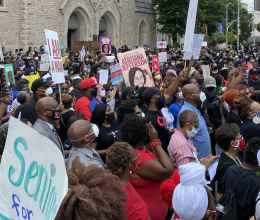
Following Crossover Day, ACLU of Georgia staff gathered to discuss our priorities for the remaining days of the legislative session. Our advocacy started anew this week post-Crossover, with a reinvigorated focus on several bills that could impact Georgians’ civil rights.
We’re committed to killing bills such as a “religious freedom” bill that is essentially a license to discriminate against the LGBTQ+ community and the dramatic expansion of criminal offenses requiring people to post bail, and supporting good ones, such as voting bills that would make it easier for Georgians to have their voices heard at the ballot box. While some bills did not cross over, it does not mean they will not re-emerge — bad bills can find their way into other pieces of legislation that are still under consideration. Anything is possible.
Here are five bills we’re fighting for or against as we move closer to the end of session:
The “religious freedom” bill is not what it seems, or what some lawmakers would have you think it achieves. LGBTQIA+ people will be at higher risk for discrimination if SB 180 becomes law.
The bail bill has been sent to the governor to sign into law and we will sue if this happens. Black people — who already make up a disproportionately high percentage of Georgia’s prison and jail populations — will bear the brunt of this legislation.
A terrorism bill could charge Georgians as terrorists when they are simply advocates of an issue. Our attorneys warn that if the bill is passed, it will be used to silence any dissent that lawmakers disagree with.
Any bills that limit voter access. We are watching for any legislation that limits voter access. A handful of both good and bad voting bills failed to cross over last week, but the likelihood of some of them being reintroduced into legislation covering a range or even unrelated topics is high.
A consumer privacy bill making its way through the House falls short of protecting Georgians’ personal and private data. The Senate passed one of the worst bills in the nation that protects Big Tech companies instead of people.




